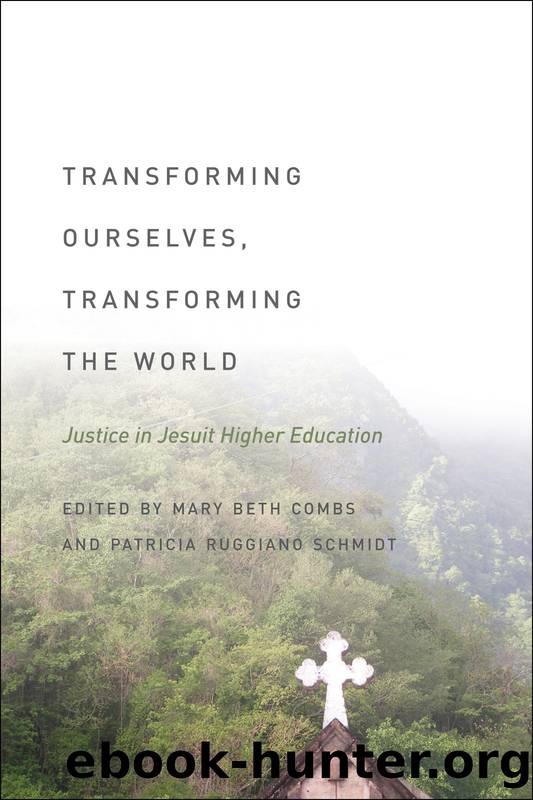Transforming Ourselves, Transforming the World by Combs Mary Beth;Schmidt Patricia Ruggiano; & Patricia Ruggiano Schmidt

Author:Combs, Mary Beth;Schmidt, Patricia Ruggiano; & Patricia Ruggiano Schmidt
Language: eng
Format: epub
Publisher: Fordham University Press
Published: 2013-08-15T00:00:00+00:00
How the Spiritual Exercises Fit with Legal Education
According to Gerald Fagin, SJ, one of the leading modern interpreters of the Spiritual Exercises, the Spiritual Exercises have a two-fold purpose. First, the Exercises were designed by Ignatius to help a person âto overcome oneself, to order oneâs life, so one could reach an ordered decision in oneâs lifeâ (Fagin 2005, 59). A second purpose developed later, as people began to use the Exercises to enrich their spiritual life and to learn how to live out the Gospel more fully in their lives (ibid.) For Father Fagin, the Exercises free up a mind to make a decision without interference from feelings regarding pleasure, power or prestige and, in doing so, that decision will be both authentic to the person but also more in keeping with the Gospel. In many ways, the Spiritual Exercises are uniquely compatible with a legally trained mind. Ignatius was nothing if not a bottom-line thinker and doer just as law students and lawyers are trained to be. For Ignatius, the Spiritual Exercises were a means to an end. The endâthe purpose and goal of lifeâis to praise, reverence, and serve God and to come to eternal life (ibid.). In the face of great and systemic injustices in the world, it may seem somewhat heretical and self-absorbed to suggest that the prime beneficiaries of law students pursuing justice in an Ignatian key are not those served by law students but, instead, are the law students themselves. In defense of such apparent narcissism, Decree 4 of the 32nd General Congregation is helpful: âPeople today are somehow aware that their problems are not just social and technological, but personal and spiritual. They have a feeling that what is at stake here is the very meaning of man: his destiny, his future. Men are hungry: but hungry not just for bread, but for the Word of God.â Contrary to popular belief, law students are humans and they thirst for meaning to sustain them in their careers and their lives. Serving justice and having the space to reflect upon that service enables law students to recognize and embrace that they and their work have meaning.
Decree 4 is a rich vein for justice-minded law faculty and administrators to probe. Justice as its own reward allows law students and attorneys to escape the âcult of money, prestige, and power [which] has as its fruit the sin of institutionalized aggression â¦, and it ends in the enslavement not only of the oppressed but of the oppressor.â Unless they come to grips with their part in combating injustice, law students and attorneys drift into the cult of money. The mission of a legal educator is to teach students legal structure, principles, and doctrines and, with respect to legal clinics, to nurture advocacy and client relation skills. No less important to a legal educator is the mission to preserve the integrity and longevity of law students as future attorneys. Substantive knowledge and legal acumen will do little to guard law students against the insidious pressures and alluring prizes they will face as attorneys.
Download
This site does not store any files on its server. We only index and link to content provided by other sites. Please contact the content providers to delete copyright contents if any and email us, we'll remove relevant links or contents immediately.
The Art of Coaching Workbook by Elena Aguilar(51161)
Trainspotting by Irvine Welsh(21643)
The Secret History by Donna Tartt(19052)
Twilight of the Idols With the Antichrist and Ecce Homo by Friedrich Nietzsche(18622)
All the Missing Girls by Megan Miranda(15957)
Cat's cradle by Kurt Vonnegut(15335)
Ready Player One by Cline Ernest(14644)
Talking to Strangers by Malcolm Gladwell(13347)
Fangirl by Rainbow Rowell(9229)
The remains of the day by Kazuo Ishiguro(8975)
The Compound Effect by Darren Hardy(8948)
Thirteen Reasons Why by Jay Asher(8893)
Tools of Titans by Timothy Ferriss(8365)
Periodization Training for Sports by Tudor Bompa(8254)
Wonder by R. J. Palacio(8097)
The Lover by Duras Marguerite(7893)
A Court of Wings and Ruin by Sarah J. Maas(7821)
Change Your Questions, Change Your Life by Marilee Adams(7759)
The Complete Stick Figure Physics Tutorials by Allen Sarah(7363)
